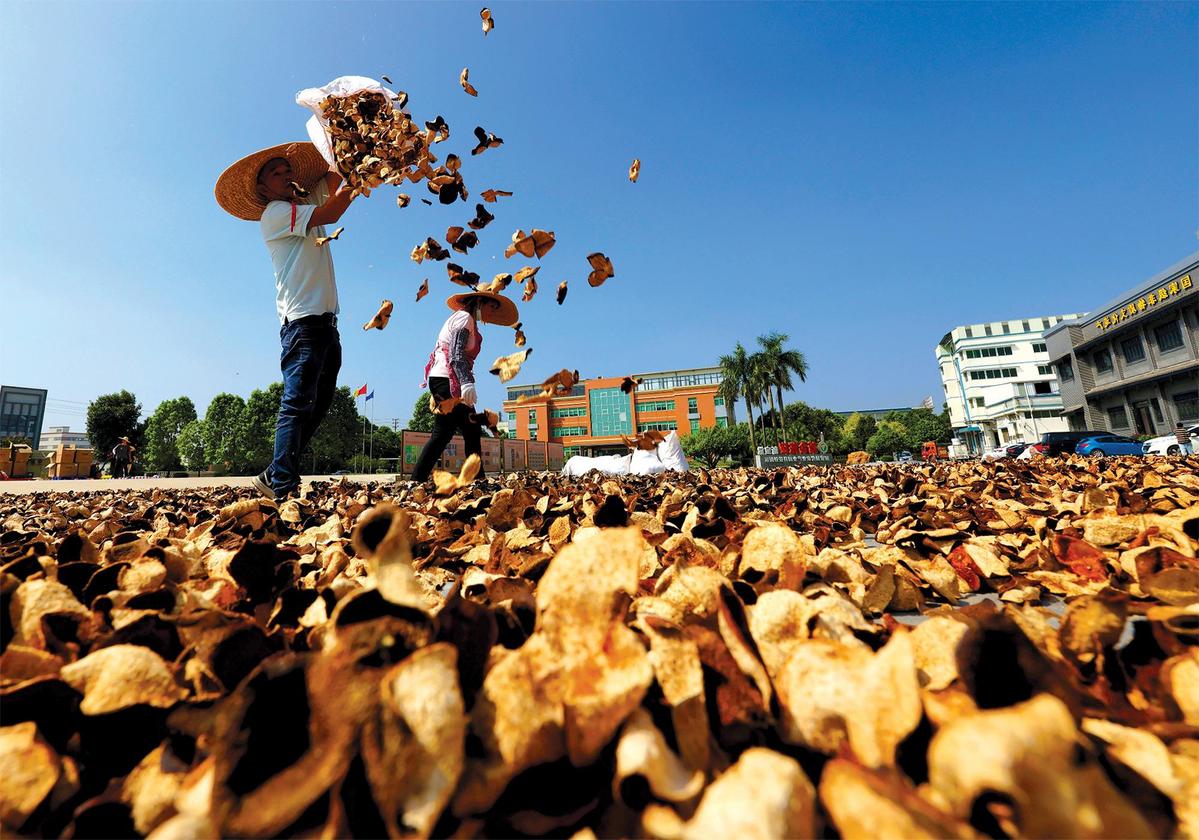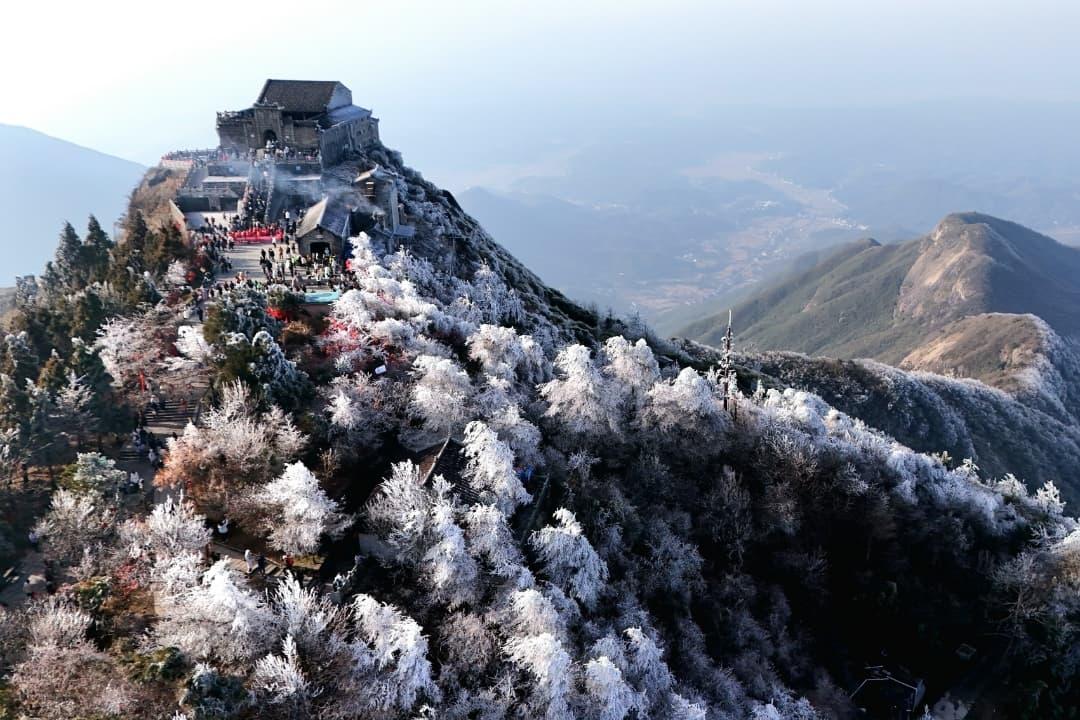Innovation breathes new life into time-honored chenpi industry


Dating back over 1,000 years, chenpi, or dried tangerine peels, is a unique ingredient in Chinese cuisine and traditional Chinese medicine.
It's also one of the traditional "three treasures of Guangdong", besides old ginger and straw. In the Ming Dynasty (1368-1644), pharmacologist Li Shizhen had written in his book Bencao Gangmu (Compendium of Materia Medica) that "the ones (dried tangerine peels) from Guangzhong are considered superior". Guangzhong now refers to Xinhui district, Jiangmen city, Guangdong province.
Xinhui is one of the most significant producing regions of chenpi. The district's unique geographic location, situated in the Northern Hemisphere's tropical maritime monsoon climate, provides ample heat, sufficient sunlight, abundant rainfall, and an extensive frost-free period.
With its location facing the sea and nestled between mountains - Guifeng Peak to the north, and Gudou Mountain to the south - and at the convergence of two rivers, where fresh and saltwater meet, it forms an alluvial plain. These conditions, coupled with fertile soil, make it an excellent environment for the growth of the unique variety of Xinhui tangerines.
In the production of chenpi, it's a set of complicated processes that have been passed down for centuries, including repeated picking, peeling, flipping, sun-drying and aging. It has grown into a vast industry for many locals' livelihood to sell chenpi across the nation and overseas. Moreover, it has been inherited as local culture.
Currently, the dried tangerine peel industry has more than 100 varieties in six major categories - medicine, food, tea, health, cultural tourism, and finance - with a total planting area for tangerines in Xinhui reaching about 66.67 square kilometers.
The Xinhui local government has initiated a slew of policies to bolster the chenpi manufacturing sector in a bid to develop the district into the Chinese chenpi trading center. The district's commitment to this industry is evident in the 2022 figures, with the total output value of the entire chenpi supply chain reaching 19 billion yuan ($2.67 billion).
However, the majority of chenpi production is at small workshops that do not have their own brand, resulting in market confusion, limiting its development toward the higher-value of the industrial chain and broader market.
Rooted in a four-generation legacy, Guangdong Xinbaotang Biological Technology Co, a chenpi manufacturer, has been striving to elevate its brand above the fray of local family workshops, and rely on the city's celebrated specialty and its unique culture.
Chen Bozhong, CEO of the firm, says he slept alongside chenpi for a long period of his childhood. "I was in the countryside back then, and my house doubled as a storage space, which was always filled with dried tangerine peels."
"It's like chenpi has become a part of our family," he adds. "It feels more like a gene that has been with them since birth." Chen's ties with chenpi led him to resign from a well-compensated position as a manager in a mobile communication company.
While many local chenpi manufacturers operate in the wholesale sector, grappling with low profit margins and a lack of consumer recognition, Xinbaotang identified an opportunity for brand development and the need for large-scale operations to boost earnings.
Consequently, Chen made a strategic decision to pivot away from the wholesale model and concentrate efforts on revitalizing the Xinbaotang brand name.
He says one of the challenges in preserving tradition is the lack of standardized teaching materials, with knowledge primarily passed down orally. Since taking over, Chen has transformed this oral transmission mode into a fixed, written format.
"The company has standardized and systematized processes, created images and produced videos to record details. We have also compared our products' images with chenpi from different years to understand changes in color, texture and flavor."
In traditional Chinese medicine, aged tangerine peel is a warm qi-regulating herb that tones the lung and spleen. The longer these peels are stored, the more therapeutic effects they have. In Chinese dishes, it can be made into desserts in a red bean soup.
While Xinbaotang relies on its traditional dried tangerine peel business in the fields of traditional Chinese medicine and food, it has innovated a wide range of dried tangerine peelrelated products, including health supplements, beverages, organic fertilizers, clean-energy products and hand sanitizers.
Chen says the company's chenpi coffee and chenpi yogurt are much welcomed in Hong Kong, securing shelf space in major supermarkets across the city. The company has reported encouraging feedback from initial sales. One Hong Kong distributor signed a contract with Xinbaotang in October.
The company, in collaboration with various universities, has embarked on projects aimed at transforming the residue of fermented Xinhui tangerines into organic fertilizers. It is also seeking effective solutions to prevent the discarded tangerine pulp from polluting the environment.
- China willing to advance just and equitable global anti-corruption system
- Chongqing hosts Silver Age fashion model competition
- Hengshan Mountain glistens with iconic winter rime scenery
- Ningbo hospital staff disciplined following pediatric surgery death
- Mainland warns Taiwan leader against provoking conflict
- Former senior official of Shenzhen under investigation





































